Here in the United States, McDonald’s is busy assuring us that their chicken nuggets are definitely made out of chicken. Over in Japan, the company has a different challenge: assuring the public that their food does not contain pieces of vinyl or human teeth. That’s in addition to the ongoing fry shortage due to a potato shortage in Japan. [More]
food supply
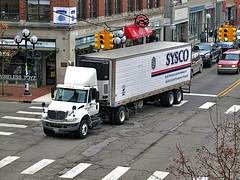
Sysco To Buy U.S. Foods, Gobbling 1/4 Of Foodservice Supply Industry
When you go out to eat at establishments ranging from the fanciest restaurants to a humble hot dog stand, there’s a pretty good chance that at least part of your meal came from either Sysco or U.S. Foods, the two biggest companies in the category. Now Sysco has announced plans to acquire the smaller company, and together they’ll have 25% of the food-service supply business. [More]
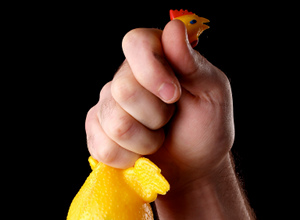
USDA Tightens Chicken Rules
Yesterday the USDA announced new poultry safety rules intended to slightly reduce the number of poisonings annually from salmonella and campylobacter. An agency official says that the new rules should prevent about 65,000 cases of food sickness a year, which is only a fraction of the over a million cases annually. However, most of the other food products that contribute to that number fall under FDA regulation, so the USDA can’t say anything. “This is something we can do, so we’re doing it,” the spokesman told the Los Angeles Times. [More]
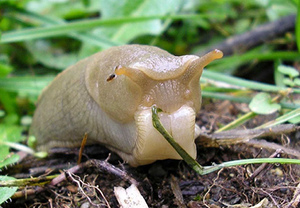
War Declared On Salt!
Are you tired of the high fructose corn syrup battles? Today the Institute of Medicine, part of the National Academy of Sciences, released a report that said Americans on average eat enough salt every second to kill a humpback whale kraken. I have not actually read the report, but it probably said something like that. It also said that public education campaigns have failed to reduce sodium intake, and voluntary self-regulation by the food industry hasn’t been effective. [More]
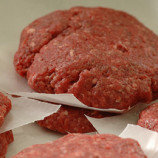
Why E. Coli Still Makes Its Way Into Your Meat Supply
Before you bite into that juicy hamburger, you might want to better understand how the meat industry creates, tests (or doesn’t test), then distributes ground beef. A detailed investigation by Michael Moss at the New York Times proves eating it is “still a gamble. Neither the system meant to make the meat safe, nor the meat itself, is what consumers have been led to believe.”

Secret Film Of Hy-Line Hatchery Shows "Inappropriate Action" Of Workers
If you get easily upset at animal welfare stories, skip this post or come back to it later when you’ve mentally prepared yourself. It’s sort of messed up. On the other hand, haven’t you always wondered how hatcheries can produce only female chickens?

../..//2009/07/08/the-fda-has-issued-a/
The FDA has issued a new ruling that says egg producers must “test regularly for salmonella and buy chicks from suppliers who do the same,” and that eggs “will have to be refrigerated on the farm and during shipment” as well as by wholesalers and in the store. The rule is meant to cut down on the number of egg-related salmonella cases nationwide, which currently are around 142,000 a year. [Washington Post] (Photo: Andreas Kollegger)

New Survey Says Less Than 20% Of Consumers Trust Food Supply
Is it any surprise that after the past few years of outbreaks and recalls, almost no one trusts products from food manufacturers anymore? IBM recently completed a survey of shoppers in the 10 largest cities, and found that a lot of consumers want more information than they currently can get about their food choices.

../..//2009/05/01/sure-worry-about-your-own/
Sure, worry about your own health, you selfish prick. Farmers, on the other hand, are worried that you will spread swine flu to their pigs. [Reuters]
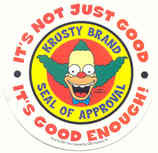
Private Food Safety Inspectors Routinely Give Seal Of Approval To Dangerous Food
Large companies routinely rely on private audits to prove that their food is safe even though private auditors are dangerously incompetent, according to a New York Times investigation. The private auditor who inspected the Peanut Corporation of America plant responsible for unleashing the massive salmonella contamination was trained to audit bakeries and repeatedly gave the plant a “SUPERIOR” rating, partly because he “never thought that [salmonella] would survive in the peanut butter type environment.”
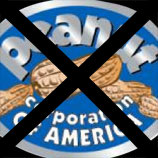
Peanut Corp Has Gone Out Of Business
It was bound to happen, and it looks like it just did: Peanut Corporation of America has filed for Chapter 7 bankruptcy, and will liquidate its assets to pay off creditors.
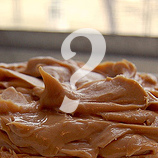
So, Who's To Blame For The Salmonella Outbreak? PCA, The FDA, The CDC…
We know there’s salmonella story fatigue setting in, but this new overview from yesterday’s Senate hearing is the best yet as far as piecing together exactly how salmonella-tainted peanut butter made it into our food supply for such a long period of time, and why it took so long to trace it back to a single rotten peanut plant in Georgia. Ultimately the blame lies with Peanut Corporation of America (PCA) for failing to maintain its factory and for not destroying lots that tested positive for salmonella, but both the FDA and the CDC had a role in it, too. One example: the FDA didn’t even know the plant produced peanut butter or peanut paste until 2007.
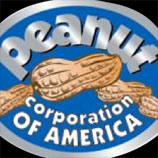
Peanut Corp Says Salmonella Plant Was Regularly Inspected, Given Good Ratings
Peanut Corp. of America is now saying that its Georgia plant was regularly inspected by the FDA and given a “meets or exceeds” rating. This doesn’t excuse the company from its own failings, but we think it points out what President Obama recently noted, which is that the FDA inspection system doesn’t seem to work very well.
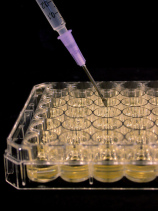
How Unscrupulous Food Manufacturers Manipulate Lab Tests
In yesterday’s Peanut Corp. post, our commenter microguy07828 left a detailed explanation of how food manufacturers sometimes play dirty when it comes to getting the lab results they want on a product. We though it deserved more visibility in light of yesterday’s accusation that the Peanut Corp. of America knowingly shipped tainted peanut butter. As microguy07828 puts it, it “happens more often than you would think.”

Do You Know What Grade Of Beef Taco Bell Uses? Do They? Does Anyone?
A reader sent us the contents of a Better Business Bureau complaint filed against Taco Bell. It describes how a customer tried repeatedly to find out what grade beef Taco Bell uses in its food, and how nobody at the company was able or willing to provide an answer. Not surprisingly, the BBB complaint also went unanswered. Let’s just hope they’re not sourcing their beef from forklift cattle, which is like downer cattle but has odd prong-shaped bruises on the side.
../..//2008/02/28/the-humane-society-of/
The Humane Society of America has sued the USDA in an attempt to close a loophole that allows downer cows who aren’t otherwise ill into the food supply. They claim the loophole increases the risk of introducing mad cow disease to humans, and leads to abuse against the cattle—like with, oh, say, a forklift. [Wall Street Journal]

USDA Pays Farm Subsidies To Dead Farmers
The USDA likes to pay dead farmers to grow corn, according to a new report from the Government Accountability Office. Some of the dead farmers received in excess of $500,000 in government subsidies. Hmm! How very mysterious!
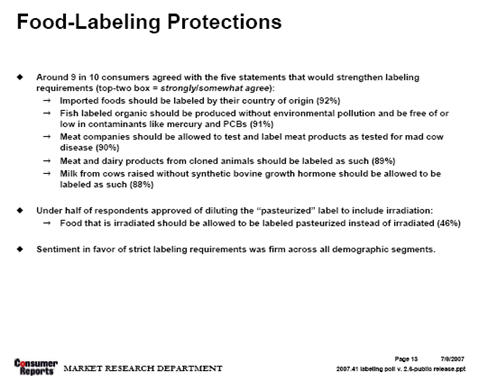
92% Of Americans Want Country Of Origin Labels On Food
According to a national survey conducted by Consumer’s Union, the non-profit organization that publishes Consumer Reports, 92% of Americans want country of origin labels on their food. Country of origin labels are required on all imported food, thanks to a 5 year old law, but that law has never been enforced.


